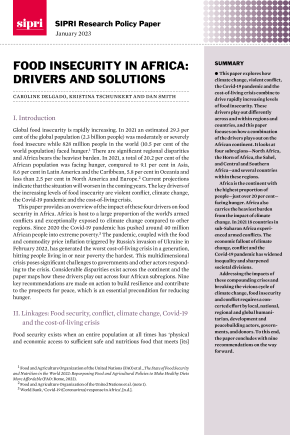Food Insecurity in Africa: Drivers and Solutions

This paper explores how climate change, violent conflict, the Covid-19 pandemic and the cost-of-living crisis combine to drive rapidly increasing levels of food insecurity. These drivers play out differently across and within regions and countries, and this paper focuses on how a combination of the drivers plays out on the African continent. It looks at four subregions—North Africa, the Horn of Africa, the Sahel, and Central and Southern Africa—and several countries within these regions.
Africa is the continent with the highest proportion of people—just over 20 per cent—facing hunger. Africa also carries the heaviest burden from the impact of climate change. In 2021 18 countries in sub-Saharan Africa experienced armed conflicts. The economic fallout of climate change, conflict and the Covid-19 pandemic has widened inequality and sharpened societal divisions.
Addressing the impacts of these compounding crises and breaking the vicious cycle of climate change, food insecurity and conflict requires a concerted effort by local, national, regional and global humanitarian, development and peacebuilding actors, governments, and donors. To this end, the paper concludes with nine recommendations on the way forward.
I. Introduction
II. Linkages: Food security, conflict, climate change, Covid-19 and the cost-of-living crisis
III. Overview of the linkages in Africa
IV. Subregional and country-specific evidence and promising initiatives
V. Conclusions and the way forward


